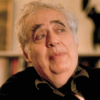Harold Bloom

Harold Bloom
Harold Bloomis an American literary critic and Sterling Professor of Humanities at Yale University. Since the publication of his first book in 1959, Bloom has written more than 20 books of literary criticism, several books discussing religion, and a novel. He has edited hundreds of anthologies concerning numerous literary and philosophical figures for the Chelsea House publishing firm. Bloom's books have been translated into more than 40 languages...
NationalityAmerican
ProfessionTeacher
Date of Birth11 July 1930
CountryUnited States of America
It is by extending oneself, by exercising some capacity previously unused that you come to a better knowledge of your own potential.
The world does not get to be a better or a worse place; it just gets more senescent.
Sometimes one succeeds, sometimes one fails.
The second, and I think this is the much more overt and I think it is the main cause, I have been increasingly demonstrating or trying to demonstrate that every possible stance a critic, a scholar, a teacher can take towards a poem is itself inevitably and necessarily poetic.
One measures oncoming old age by its deepening of Proust, and its deepening by Proust. How to read a novel? Lovingly, if it shows itself capable of accomodating one's love; and jealously, because it can become the image of one's limitations in time and space, and yet can give the Proustian blessing of more life.
No one yet has managed to be post-Shakespearean.
You know, I don't want to be offensive. But 'Infinite Jest' [regarded by many as Wallace's masterpiece] is just awful. It seems ridiculous to have to say it. He can't think, he can't write. There's no discernible talent.
Shakespeare is the true multicultural author. He exists in all languages. He is put on the stage everywhere. Everyone feels that they are represented by him on the stage.
No poem, not even Shakespeare or Milton or Chaucer, is ever strong enough to totally exclude every crucial precursor text or poem.
In the finest critics one hears the full cry of the human. They tell one why it matters to read.
Shakespeare is universal.
How to read "Harry Potter and the Sorcerer's Stone"? Why, very quickly, to begin with, and perhaps also to make an end. Why read it? Presumably, if you cannot be persuaded to read anything better, Rowling will have to do.
Everything in life is arbitrary yet must be over-determined in literature. Jean McGarry knows how to tell a persuasive tale illuminating these truths.
I am naive enough to read incessantly because I cannot, on my own, get to know enough people profoundly enough.